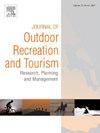Measuring belongingness in outdoor orientation programs
Abstract
Outdoor orientation programs (OOPs) are reported to be successful at increasing students' feelings of belongingness. Currently only a handful of measures exist for assessing college students’ sense of belonging. This exploratory study examines three belongingness scales currently used in higher education assessing their effectiveness as measures of OOPs: the Student Belongingness Scale, the Workplace Belongingness Scale, and a one-question belongingness measure. The scales varied in their focus; for example, the Student Belongingness Scale measured perceptions of both peer belonging and institutional belonging. Researchers determined that scales focusing on belongingness to a small group provided the most useful data for OOPs. Management Implications: The findings of this study suggest managers of outdoor recreation programs consider ways to measure a sense of belongingness among participants as belongingness continues to grow as a measurement concept important to managers of outdoor recreation programs. Researchers recommend using an adaptation of the Workplace Belongingness Scale (renamed The Adventure Belongingness Scale) because the scale has both face validity and high correlations with the Behavioral Trust Inventory. The Student Belongingness Scale provides particularly useful data for assessing belongingness to institutions. Both scales should be considered to provide insight into the effectiveness of OOPs. The data for this study were collected via an online survey conducted in the fall of 2021.

 求助内容:
求助内容: 应助结果提醒方式:
应助结果提醒方式:


